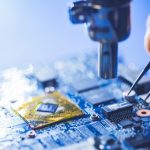Tesla is positioned to counter a three-decade-old prediction by renowned astronomer Carl Sagan, who in 1995 foresaw a decline in U.S. manufacturing. This perspective is supported by Morgan Stanley analysts who highlight Tesla’s integration of artificial intelligence (AI) as a key factor in revitalizing American manufacturing. The company’s advancements in AI not only bolster its production capabilities but also set a precedent for leveraging technology to sustain industrial growth.
Tesla’s innovative use of AI in its manufacturing processes has enabled the company to scale the production of electric vehicles and energy products efficiently. This technological adoption contrasts with the broader trend of manufacturing decline in the United States, where many companies have moved production overseas. By maintaining and advancing its manufacturing base domestically, Tesla is reshaping the narrative around American industrial capabilities.
Can AI Reinvent U.S. Manufacturing?
The integration of AI into manufacturing processes is a significant factor in Tesla’s ability to sustain and grow its production. AI allows for greater precision, efficiency, and scalability in manufacturing operations. According to Adam Jonas of Morgan Stanley, Tesla’s commitment to AI could reverse the trend of declining manufacturing by fostering innovation and efficiency within American industries.
What Role Does Data Play in Tesla’s Strategy?
Data collection is central to Tesla’s AI strategy, with the company amassing millions of data points to enhance its self-driving technology and optimize the performance of its Optimus bot. This extensive data utilization enables Tesla to refine its products continually, ensuring they remain competitive in the rapidly evolving tech landscape.
How Does Tesla’s Leadership Influence Its Manufacturing Approach?
Elon Musk’s leadership has been pivotal in prioritizing AI within Tesla’s manufacturing processes. While Musk acknowledged a period of over-reliance on AI, the company’s ongoing commitment to data-driven innovation has strengthened its manufacturing capabilities. This leadership approach ensures that Tesla remains at the forefront of integrating advanced technologies into production.
Tesla’s strategic focus on AI and manufacturing innovation distinguishes it from other companies in the tech and automotive sectors. By emphasizing intelligent machine production and domestic manufacturing, Tesla not only supports its own growth but also contributes to broader economic resilience. This approach underscores the importance of technological investment in maintaining robust industrial sectors.
Tesla invites high school seniors to its Manufacturing Development Program, emphasizing the company’s dedication to nurturing future talent in the manufacturing and AI fields. This initiative reflects Tesla’s broader strategy to invest in domestic manufacturing capabilities and ensure a skilled workforce for the future.
The sustained investment in AI and manufacturing by Tesla highlights a potential shift in U.S. industrial strategy. As the company continues to innovate, it sets an example for other industries to follow, potentially leading to a resurgence in American manufacturing prowess. This development could have significant implications for the U.S. economy, reinforcing the importance of technology-driven manufacturing.
With its advanced AI integration and commitment to domestic manufacturing, Tesla may play a crucial role in reversing the decline predicted decades ago. The company’s efforts could inspire broader industrial reforms and technological investments, fostering a more resilient and competitive U.S. manufacturing sector.










